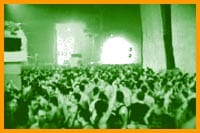North American healthcare pros are worried that partygoers chasing a new and improved high are taking the increasingly popular “trail mix” – a powdered concoction of crushed ecstasy and one or more drugs like cocaine, ketamine and methamphetamine.
GHB is also a notable culprit, because appropriate dosages are hard to measure, and it’s dangerous mixed with other drugs, including alcohol.
“Right now, what’s really new is the rapid adoption of liquid GHB. That’s where we’re seeing the most overdoses,” says Alan Brown.
As the founder of the Electric Dreams Foundation, Brown is at the vanguard of the party-safe movement. Based in Connecticut, he’s widely recognized as the father of overdose prevention in North America. His all-volunteer group staffs intervention programs across the continent, supplying medical support through doctors, nurses and paramedics who work at one party or another every week in the US and Canada.
The foundation is now funded by such gay-event organizers as the Bad Boy Club Montreal (BBCM), The Saint At Large and Atlantis Events.
Brown was in Montreal this fall for the BBCM Black And Blue circuit party, which hosted its fourth annual two-day Gay Health Summit.
“I wrote a monthly column for seven years and came to know all the DJs and promoters and saw all the handwringing over overdoses,” says Brown about how he got involved. He attended 65 circuit parties in 1998. “But no one was doing shit about it. So I started Electric Dreams. I was tired of all the bitching and moaning.”
Brown quickly realized “no matter how much education or prevention you do, there will always be people who will push themselves too far. Our rule of thumb is about one overdose per thousand people at parties. But in the last year or two, were seeing more overdoses at parties.”
Increasingly, it’s the promoters who are trying to do something about it. Black And Blue’s Gay Health Summit was originally launched to help counter attacks that AIDS benefit circuit parties increase the spread of AIDS when participants get high and have unsafe sex. Though it’s kept that focus, the forum has expanded to address harm reduction around drug use. This year’s summit drew a stellar cast of healthcare professionals, researchers and advocates from across North America, including Brown.
Summit participants also heard a report from the American Journal Of Public Health that the atmosphere of circuit parties contributes to the spread of HIV and other sexually transmitted diseases.
The survey of 295 circuit party-going gay and bisexual men from the San Francisco area says that one fourth of them reported an “overuse” incident in the previous year. During the three-day party weekend, 28 percent reported having unprotected anal sex.
“Consistent with other studies, we found drug use to be associated with sexual risk behaviour,” wrote project officer G Mansergh.
The study found 84 percent of the partygoers reported using illegal drugs during their most recent party weekend: ecstasy topped the list at 75 percent, followed by ketamine (Special K) with 58 percent, crystal meth with 36 percent, GHB with 25 percent and Viagra (the prescription erectile dysfunction drug that can be dangerous when mixed with other drugs) with 12 percent.
“Nearly all of the respondents reported using a psychoactive drug during their most recent circuit party weekend; only 11 percent consumed alcohol exclusively,” wrote Mansergh.
The study recommended peer-led prevention campaigns, including programs that would address behaviour away from party events in homes, hotels, local bars, clubs and bathhouses.
“Circuit parties are important social venues for many men,” says the report. “More can be done in terms of building awareness, promoting education, altering social norms and establishing structural mechanisms that influence behaviour.”
At Black And Blue, where Montreal doctors Pierre Tellier and Yvan Grenier have treated about 100 partygoers over more than three years. They report roughly half their patients at those parties were between 18 and 30 and only 40 cases were considered “serious.” About 36 percent were on ecstasy, 17 percent on GHB, 17 percent on ketamine and the rest had consumed either speed, alcohol or magic mushrooms. Many of them had mixed their drugs.
Though the statistics weren’t yet compiled, numbers of overdoses were believed to be lower this year, particularly since post-Sep 11 attendance dipped to 11,000 partygoers from roughly 20,000 last year.
Setting aside all the stats, Brown says the real measure of drug abuse isn’t just the number of overdoses at circuit parties, but how functional people are in their everyday lives.
“These drugs have passed beyond parties and into our homes,” says Brown. “Are people able to maintain positive relationships and keep their jobs? I think the ultimate frontier of our work is to empower friendship networks to care for each other, because we can’t provide help all the time. But we can empower you to help your friend. If there’s any hope for us, it’s in the strength of our community helping each other out.
“The fact there is a health movement coming from within the party scene is a coming of age for the party scene…. Circuit parties were an underground phenomenon for the last 16 years and have now become part of gay mainstream culture. We must now assert responsibility for the associated health issues before someone else does it for us.”
For more information, check out Electricdreams.org, Dancesafe.org and Partysafe.org.


 Why you can trust Xtra
Why you can trust Xtra


